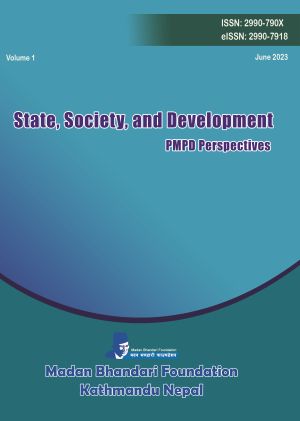Bhandari’s Rhetoric in the 1990s Political Dynamics: Institutionalizing Democracy in Nepal
DOI:
https://doi.org/10.3126/ssd.v1i1.58468Keywords:
Hero, Political philosophy, PMPD, Art of rehetoric, Repetition and parallel, Myths and metaphorsAbstract
Rhetoric can be described as an art of persuasion, encompassing both words and actions. It is associated with the relationship between an addresser and an addressee in the process of communication. In the early post-1990 era in Nepal, CPN (UML) Secretary General Madan Bhandari emerged as a popular leader with his political philosophy of People’s Multiparty Democracy (PMPD), effectively employing the art of rhetoric to connect with a diverse audience. The rhetorical analysis of Bhandari’s speeches, which covered topics such as monarchy, constitution, parliamentary elections, and the Tanakpur Treaty, had a profound impact on shaping the Nepali psyche. Using rhetorical appeals – logos, pathos, and ethos – Bhandari brilliantly persuaded the intended audience in the post-democracy Nepali society early in the 1990s. Exploiting myths and metaphors, and repetitions and parallelism, Bhandari skillfully projected a sense of hope and expectation amidst contemporary political exigencies. Bhandari’s rhetoric contained substantial democratic values and ideas for socio-economic transformation, which deeply inspired the newly liberated Nepali psyche. With a high level of respect for his audiences, he envisioned a future course of progress and prosperity for Nepal embedded in the principles of People’s Multiparty Democracy, all within the context of global political dynamics. Through a perfect balance of rhetoric and reality, Bhandari not only instilled new hope in the Nepali people but also created an image of an iconic leader dedicated to the welfare of the country and its people. As an innovative political philosophy, PMPD resonates with democratic practice in the Marxist philosophy for the masses that earned him the status of a hero in contemporary Nepali politics, relevant now, and directed to continue for decades in the South Asian geopolitical sphere.
Downloads
Downloads
Published
How to Cite
Issue
Section
License
Once published, an article in this Journal is not permitted to publish in other journals or similar publications without the permission of the Foundation. Contents and perspectives presented in the articles in the journal are solely of the authors.




